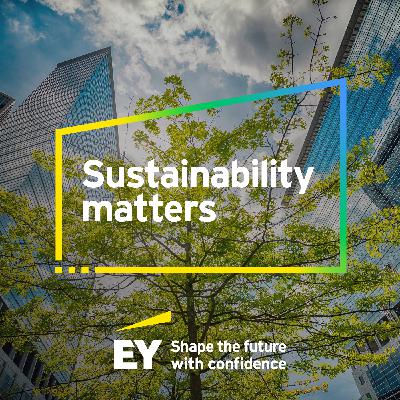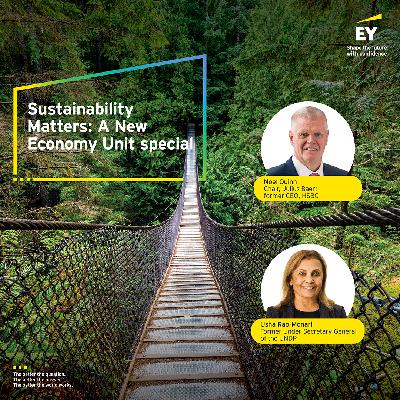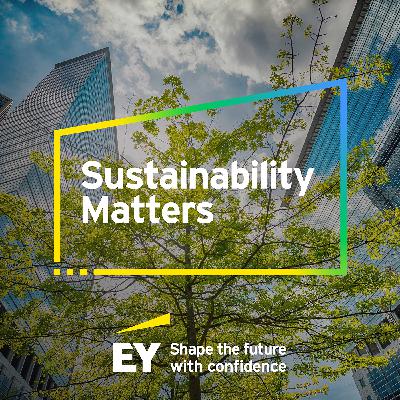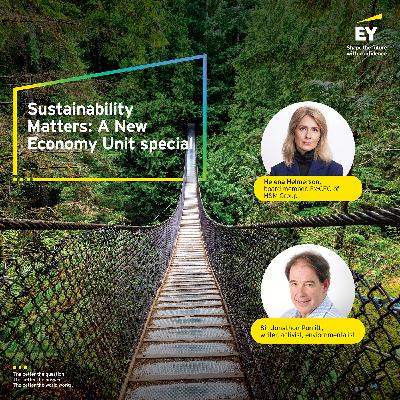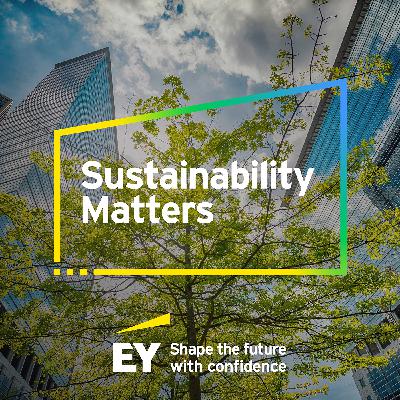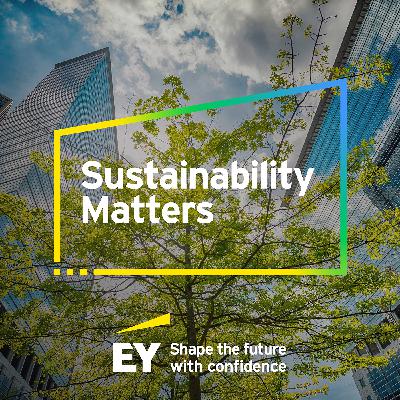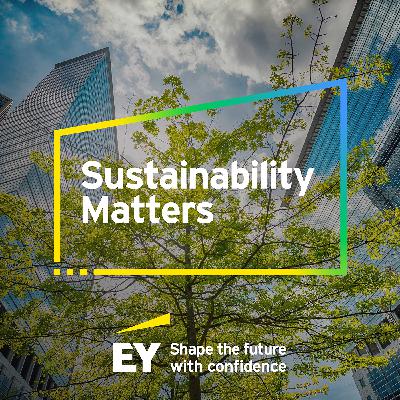Discover EY Sustainability Matters
EY Sustainability Matters

EY Sustainability Matters
Author: EY
Subscribed: 107Played: 1,088Subscribe
Share
©2025 Ernst & Young, LLP. All Rights Reserved.
Description
The EY Sustainability Matters podcast explores sustainability as a business issue. Hosted by Bruno Sarda, the series offers insights on key business risks and opportunities, through an environmental, social, governance and sustainability lens.
47 Episodes
Reverse
What happens when over a thousand climate-focused events converge in one city? At Climate Week NYC 2025, the private sector showed up in force, bringing bold ideas, collaborative energy and a clear shift from strategy to delivery. In this episode of EY Sustainability Matters, host Matthew Bell shares insights from leaders across various industries-utilities, consumer goods, technology and agriculture-as well as NGOs interviewed on the sidelines of EY-hosted events. Hear how artificial intelligence (AI) is transforming sustainability efforts, enabling smarter and faster decisions in the race against time. Discover why nature is no longer just an ethical concern but a material business priority. Learn how cross-sector partnerships are unlocking regenerative practices and reshaping supply chains. From boardroom strategies to landscape-level collaboration, this episode captures the pulse of NY Climate Week and the momentum building toward the upcoming COP30 in Brazil. Collaboration and cross-sector partnerships can unlock scalable climate and nature solutions, especially in agriculture and energy. Nature is now strategic, and businesses are integrating nature into core operations for resilience and profitability. From predictive analytics to emissions reduction, AI is accelerating sustainability with speed and precision. @2025 Ernst & Young LLP
This episode of the EY Sustainability Matters podcast is a rare opportunity to hear from two global thought leaders who have shaped sustainability strategies at the highest levels of business and international development, about the need for a move toward a regenerative economy, and the challenges and opportunities that will present. Nadia Woodhouse from the EY New Economy Unit (NEU) welcomes two distinguished thinkers: Sir Noel Quinn, former Chief Executive of HSBC, and Usha Rao-Monari, former Under-Secretary General of the United Nations Development Programme and member of the EY New Economy Unit Advisory Council. Both guests bring a wealth of experience from the worlds of global finance, development and industry, and currently serve as independent directors on the board of Fortescue, a global metal mining company at the forefront of commercial decarbonization. The conversation dives deep into the challenges and opportunities of building a regenerative economy. Noel shares insights from his tenure at HSBC, emphasizing the importance of economic case-making, transparency in target setting and overcoming organizational fear in driving change. Usha expands the discussion to the global scale, highlighting the push for better data, risk mitigation, and collaboration between public and private sectors — especially in emerging markets. Together, they explore the roles of policy, finance and innovation in accelerating the transition to a sustainable future, offering practical insights for leaders navigating the complexities of climate action and systemic transformation. Read more about the EY New Economy Unit here.
Host Matt Bell explores the pivotal role of Nationally Determined Contributions (NDCs) in shaping climate policy and investment strategies. He interviews four experts to get their insights. Joanna MacGregor, a senior advisor at the UN Climate Change (UNFCCC), explains how NDCs have evolved into comprehensive national climate plans that can drive economic growth and resilience. Antonina Scheer, Policy Fellow at the London School of Economics and Research Project Manager at the Transition Pathway Initiative Centre, discusses the challenges of financing climate action in emerging markets and introduces a tool that helps assess the credibility and ambition of NDCs. Pablo Carvajal, Director in the Climate Change and Sustainability Services team at EY UKI, shares insights from his work with governments and banks, highlighting the disconnect between policy targets and business implementation. Claudia Gollmeier, Managing Director at Colchester Global Investors, emphasizes the importance of investors considering NDCs and the rise of innovative financial instruments like sustainability-linked bonds. Together, the guests underscore the urgency of making NDCs investable and inclusive, involving businesses and investors in their design and execution. Despite delays in countries submitting their NDC plans, they remain optimistic about the potential of NDCs to unlock financial flows and accelerate the global transition to a low-carbon economy. NDCs are evolving into powerful economic tools that can drive growth, resilience and clean energy transitions. Businesses and investors play a crucial role in implementing NDCs, even though governments set the targets. Transparent information and innovative financial products are helping bridge the gap between climate ambition and investable action. @2025 Ernst & Young LLP
This special episode of the EY Sustainability Matters podcast is introduced by Nadia Woodhouse from the EY New Economy Unit (NEU), which focuses on the long-term, systemic shifts toward a new, regenerative economy. Nadia presents a thought-provoking dialogue with two influential leaders in sustainability: Helena Helmersson, former CEO of the fashion giant H&M Group, and Jonathon Porritt, a writer, environmentalist, advocate for sustainable development and a member of the advisory council for the NEU. The discussion centers around the pressing need for businesses to adopt regenerative practices in the face of escalating sustainability challenges and the crucial role of CEOs in driving that change. The conversation delves into critical themes, such as the tension between profitability and sustainability, the importance of structural changes within large organizations, and the importance of forming deep, cross-industry coalitions. Both guests emphasize the need for greater inclusion of sustainability professionals in decision-making roles, the need for appropriate regulation, and urge CEOs to view sustainability not just as a responsibility, but as a core business imperative that drives innovation and competitiveness. Read more about the EY New Economy Unit here. CEOs' commitment to sustainability can drive significant organizational change and inspire collective action at all levels of the business. Immediate and decisive actions are essential for companies to transition toward sustainable practices and mitigate the drastic impacts of climate change. Companies should align their economic objectives with sustainability commitments to foster innovation and resilience in an increasingly resource-constrained world. © 2025 Ernst & Young LLP
Despite the popular belief that slavery is a thing of the past, it is estimated that slavery affects around 50 million people globally. Human exploitation for labour and other forms of modern slavery are embedded within the supply chains of many of the products and services that we choose to consume regularly, whether we are buying clothes, electronics, or even a bar of chocolate. This is becoming an increasing concern for business as well. Mounting pressure from both legislative bodies that introduce new regulations and a new generation of consumers, who seem to be willing to pay more for sustainable products, signals a need for a change. In this episode of the EY Sustainability Matters podcast, host Bruno Sarda explores this topic further with Tom Veit, CEO of Asahi Global Procurement – a large Japanese consumer goods company, and Kate Skattang, Director in the Climate Change and Sustainability Services practice at EY Australia (Ernst & Young Services Pty Limited). The guests discuss the challenges posed by the issue of forced labor across global supply chains and the recent legislative changes that compel organizations to scrutinize their procurement. Tom and Kate share industry insights about how EY worked with Asahi Global to create their own human rights due diligence framework, emphasizing the importance of a top-down approach as well as putting people first across all areas of business processes. Protecting human rights is a fundamental responsibility for companies, as forced labor impacts tens of millions of people globally. Leadership commitment is essential for prioritizing human rights and implementing effective due diligence frameworks within organizations. Recent laws, such as modern slavery regulations in the UK and Australia, or Corporate Sustainability Due Diligence Directive (CSDDD), are driving companies to assess and proactively disclose human rights risks in their supply chains. © 2025 Ernst & Young LLP
In this episode of the EY Sustainability Matters podcast hosted by Bruno Sarda, the discussion centers around the vital collaboration between the public and private sectors in advancing sustainability efforts. Bruno welcomes Ruth Ahchow, EY Global Government and Public Sector Leader for Climate Change and Sustainability Services, who elaborates on the importance of public-private partnerships (PPPs) as key mechanisms for sustainable development, showcasing successful examples from around the world, including the Asia-Pacific region. Bruno and Ruth discuss how recent political shifts in regions, such as the US and Europe, influence sustainability initiatives. Ruth also provides actionable insights, urging governments to actively participate in sustainable procurement and create stable policies that encourage green investments, while companies are encouraged to integrate long-term sustainability into their core strategies. 01:48 - Evolution of sustainability in the public sector through Ruth's career 05:50 - Understanding PPPs 08:06 - Examples of successful PPPs around the world and in the Asia-Pacific 16:16 - The impact of political shifts on sustainability 19:41 - Role of sustainability reporting standards 25:34 - Actionable insights for business and governments © 2025 Ernst & Young LLP
In this episode of the EY Sustainability Matters podcast, host Bruno Sarda and guests dive into the intersection of sustainability and the music industry. Discussing the topic with Bruno are: Joel Makower, Chairman and Cofounder of the Trellis Group (formerly GreenBiz) and the Strategy Director & Industry Council Chair of the Music Sustainability Alliance, and Olga LaBelle, Vice President and Head of Environmental, Social and Governance (ESG) at Warner Music Group. The speakers discuss the current state of sustainability in the music industry, innovative collaborations for environmental benefit, and how artists, labels, concert venues and fans can contribute to a more sustainable industry. © 2025 Ernst & Young LLP
The relationship between business and sustainability is evolving. As awareness of its importance – and value – grows, so does the recognition that responsibility for addressing the subject is not confined to specific sustainability roles. Indeed, growing opinion is that every job within an organization can and should be considered a sustainability job. In this episode, EY Americas Climate Change and Sustainability Services Leader Bruno Sarda sits down with Pia Heidenmark Cook, a former Chief Sustainability Officer at IKEA and now senior board member, speaker and sustainability advisor, and Lisen Wiren, Programme Manager at IKEA Social Entrepreneurship, to discuss the very idea that every professional within any business can make an impact. Pia and Lisen have just published a book "Embedding Sustainability - How to Drive Organizational Transformation," based on decades of their experience. Listen to this insightful conversation where two seasoned sustainability professionals talk about the importance of threading sustainability into the basis of every organization, as well as on how typically small corporate sustainability departments can make a big difference. © 2025 Ernst & Young LLP
With the world in the midst of a global polycrisis, the New Economy Unit (NEU) — a global research group at the EY organization — was established to look at the key economic forces at play and the leading business practices needed to create a sustainable future. Host Bruno Sarda discusses the NEU and a bigger idea of regenerative business transformation it represents with Matt Bell, EY Global Leader, Climate Change and Sustainability Services, and Anastasia Roussou, EY Head of New Economy Research Unit, in London. Moreover, the discussion covers the work the NEU does with the activist and academic community, some of whom sit on the NEU advisory board. It also highlights the importance of taking a long-term view while not neglecting short-term objectives, and teases what the NEU will be exploring next. Please, read the full report "A new economy - Exploring the root causes of the polycrisis and the principles to unlock a sustainable future" on ey.com, or contact the New Economy Unit at neweconomyunit@uk.ey.com. Key takeaways include: The New Economy Unit help enables practitioners to think about the long-term future and what they need to radically change. The report aims to bring everyone on the same page and mainstream the concepts that will likely aid the transition to long-term sustainability. © 2024 Ernst & Young LLP
In this episode, Bruno Sarda, host of the EY Sustainability Matters podcast, meets with prior guests to talk about the significant developments in sustainability over the past year, ahead of the upcoming UN Climate Change Conference or COP29 in Baku, Azerbaijan, later this November. Amy Brachio, EY Global Vice Chair for Sustainability, and Matt Bell, EY Global Leader for Climate Change and Sustainability Services, share their experiences from the 2024 New York Climate Week . They discuss the transition from addressing environmental issues in siloes to a comprehensive view that acknowledges the interdependence of various sustainability factors that must be addressed together. The speakers share their expectations for the upcoming COP29, underscoring emerging trends, such as the increased emphasis on finance and carbon markets to support the transition. In the final part of the episode, Amy and Matt express optimism about the future, talking about the businesses' desire for innovation, investment in new technologies and a collective willingness to undertake systemic change. © 2024 Ernst & Young LLP
With the upcoming 2024 United Nations Biodiversity Conference, also known as COP16, this episode of the Sustainability Matters podcast explores the critical link between nature, biodiversity and human wellbeing. EY leaders Alex Banks and Ana Luci Grizzi join host Bruno Sarda to discuss the challenges and the key decisions that should be taken for meaningful progress to be made. The thought-provoking discussion emphasizes the need to integrate biodiversity conservation into our economic models and addresses the interconnected threats of climate change and biodiversity loss. Also highlighted is the importance of protecting the rights of vulnerable communities who are most affected by these environmental challenges. Key takeaways include: There is an inseparable relationship between climate change and biodiversity loss. It is necessary to integrate biodiversity strategies into existing economic growth models. Clients need to understand their nature-related risks, impacts and dependencies. Sustainable solutions have to uphold human rights, cultural sensitivities and community impact considerations. The transition to a nature-positive approach is both an imperative and an opportunity. © 2024 Ernst & Young LLP
When we sit down to enjoy a meal, at home or in a restaurant, we're rarely aware of the environmental toll our food choices may take. However, the reality is that the journey from farm to table carries a significant environmental cost, often unseen but deeply impactful. This episode of the EY Sustainability Matters podcast delves deeper into the impact the global food system has on climate change, biodiversity and land use. It also explores how digital innovation can be leveraged to make food production more sustainable without sacrificing quality or taste. Join host Bruno Sarda, EY Americas Climate Change and Sustainability Services Leader, and Hanne Thornam, EY Nordics Head of Climate Change and Sustainability Services, as they interview two leaders in the food sustainability sector to uncover the challenges facing this industry and how technology is playing a key role in addressing them. Stephen Nolan, CEO of Nutritics and the 2022 EY Sustainability Entrepreneur of the Year, shares his insights on integrating sustainable practices within the food and hospitality industry. He debunks myths that equate sustainability with compromised quality or financial viability. Alongside him, Pete Statham, Head of Sustainability and Government Relations at Sysco GB, the world's leading broadline food distributor, discusses the practical applications of Nutritics' software in making large-scale, impactful changes. He shares how even a slight change in one menu item can multiply its positive or negative environmental effect, when delivered to thousands of customers across the world. The discussion closes on a hopeful note, with the guests discussing the vast potential and opportunity that exists within the market to create a more sustainable and resilient food industry for the future. © 2024 Ernst & Young LLP
For the people of Palau, a nation of over 300 small islands in the Western Pacific, climate change is not a future threat, but an immediate and pressing reality. Rising temperatures and sea levels have changed their way of life and are already impacting communities. How are they confronting these changes, and what can the rest of the world learn from their experiences? In this episode, host Bruno Sarda is joined by Mikayla Etpison from the Palau Office of Climate Change, and Martine Crowe, a member of the EY team that codeveloped a broad climate strategy with the government of Palau. Mikayla emphasizes the disproportionate impact of climate change on Pacific nations, which, despite contributing less than 1% of all global emissions, are experiencing some of the most severe consequences. Warmer oceans, typhoons and coral bleaching threaten delicate ecosystems and the communities that depend on them. Mikayla points out that Palau has limited resources for mitigation projects and the need for support from the larger emitters is critical. The discussion also covers Palau's proactive measures, including a government climate policy, codeveloped by EY teams and Mikayla's team, that integrates traditional Palauan marine conservation practices. This episode is a testament to the resilience of island nations and the critical role of collaboration in forging a path toward a sustainable future. Listen to understand the challenges faced by Palau, the innovative strategies they employ, and the lessons they offer to the world in the fight against climate change. © 2024 Ernst & Young LLP
The case for climate action is often presented in terms of facts and data: detailing scientific evidence and financial risk. But is it time to explore different ways to communicate the message; to try an approach that focuses more on human stories and emotions? In this episode of the Sustainability Matters podcast, Bruno Sarda is joined by two colleagues from EY Climate Change and Sustainability Services (CCaSS): Managing Director Karima Zedan at Ernst & Young LLP and the Gareth Jenkins, EY Global CCaSS Head of Creative at Ernst & Young LLP, to discuss ways to reframe the sustainability narrative. Behavior change is not happening fast enough to meet climate change realities. The guests suggest that engaging the hearts as well as the minds of businesses, and bringing to life the impact on people, culture and society, is a more compelling narrative. Gareth points out that people, whether at home or the boardroom, respond to stories instinctively, and can be challenged and inspired by them. The guests discuss the importance of engaging with different audiences, from the C-suite to investors and employees. Karima emphasizes how sustainability initiatives may have a positive impact not only on the company and the brand but also on the employees and wider community. Gareth then gives some fascinating insight into the innovative EY Four Futures experience that was first presented at COP28 — an immersive installation that explores different outcomes from four potential future scenarios. Through the power of hearing each of the four stories, Four Futures can inspire joint action today. © 2024 Ernst & Young LLP
As more businesses focus on net-zero targets, voluntary carbon markets (VCMs) need to play an increasingly crucial role. The VCMs are a necessary and important tool for offsetting hard-to-decarbonize emissions, and there is a vital need to scale them; however, there are many challenges in their current state. In this episode of the Sustainability Matters podcast, Bruno Sarda and EY Sustainability Global Account Lead for Microsoft, Alissa Byersdorfer, examine the VCMs' growth and how they needs to evolve with Brian Marrs — Senior Director for Energy and Carbon Removal at Microsoft. Bruno sets the scene with a brief history of the VCMs and carbon as a commodity. He shares that VCMs are growing and are now a key component of many businesses' decarbonization strategies but there are some significant challenges around credibility and quality. Alissa explains how the alliance between Microsoft and the global EY organization helps other businesses achieve their own decarbonization goals through sustainable strategies and data management solutions. With a commitment to becoming carbon negative by 2030, Microsoft is a pioneer in this space. Brian discusses the challenges Microsoft has faced and how the VCMs need to evolve to focus more on quality carbon removal products. Brian covers why Microsoft's strategy is solely focused on investing in carbon removal programs and how they have approached the challenges of the carbon market with their four north stars on quality. Lastly, Brian shares some first-hand advice for companies exploring VCMs to achieve their net-zero goals. © 2024 Ernst & Young LLP
In this episode of the EY Sustainability Matters podcast, the spotlight is turned to the often underestimated impact of the global building and materials industry, specifically cement production, on climate change. Despite playing a crucial role in our everyday lives, this industry's significant contribution to global greenhouse gas emissions and extensive energy and natural resource consumption is often overlooked. Host Bruno Sarda is joined by EY Latin America Climate Change and Sustainability Services leader Ruth Guevara and Vicente Saiso, Global Vice President of Sustainability at CEMEX, a global leader in the building materials industry, to talk about bold decarbonization strategies in such an important sector. Vicente acknowledges the cement industry's significant contribution to global emissions but highlights its efforts to reduce its environmental footprint, mentioning key strategies involving alternative fuels, use of waste materials, and adoption of innovative technologies such as hydrogen in production processes. He explains how, through this process to decarbonize, CEMEX has found business opportunities and cost benefits. Ruth and Vicente discuss the role of waste management in creating a circular economy in the cement industry. Vicente shares how CEMEX turned waste repurposing into a business opportunity by providing services to construction customers to manage their construction and demolition waste, which contributes significantly to global waste management. The episode then explores the innovative and ambitious technologies CEMEX is pursuing to help them play the opposite role and actually reduce environmental impact through cement production. Lastly, the guests shed light on how stakeholder support is crucial for companies' decarbonization initiatives. © 2024 Ernst & Young LLP
In this episode of the EY Sustainability Matters Podcast, host Bruno Sarda discusses with Mary de Wysocki, Chief Sustainability Officer at Cisco, how companies can leverage technology for a more sustainable future. The intersection between business, technology and sustainability is accelerating, with companies increasingly digitizing their operations. This can significantly reduce waste, energy and materials required to deliver products and services. However, de Wysocki warns that if digital transformation is not done in a sustainable manner, it could have a damaging effect on our planet due to the large energy needs of cloud service providers and data farms. Companies need to integrate sustainability into their digital transformation strategies and harness the value of data to drive these initiatives. De Wysocki also emphasizes the importance of deploying emerging technologies like Artificial intelligence (AI) and automation responsibly, considering the social dimensions such as ethics, privacy information, security, digital equity and human rights. Cisco is already embedding sustainability into its operations and moving towards a regenerative, green future. They have set three priorities in its environmental strategy - accelerating the transition to clean energy, evolving the business from linear to circular, and investing in resilient ecosystems. Cisco is also working on developing a data strategy to create consistent sustainability data across the enterprise, with rigorous reviews to ensure reliability and trust. De Wysocki concludes by highlighting the importance of partnerships and collaboration for achieving sustainability goals and emphasizes the need for inclusivity and a healthy planet for future generations. Key takeaways include: Digital technologies, like AI and automation, have the potential to transform the environmental impact of companies, reducing waste and lowering energy use. There are environmental impact risks posed by intensive energy users like the Information and Communications Technology sector and cloud service providers if not powered by clean energy. Sustainability needs to be integral to business strategy, with an emphasis on a "regenerative future". Challenges include managing greenhouse gas emissions, addressing digital equity issues and appreciating the role of nature-based solutions in mitigating climate change. Companies should increase their commitment to transparency and accountability, and look to create partnerships in their value chain. © 2024 Ernst & Young LLP
Thought leaders, global decision-makers and policymakers will be convening in Dubai in late-November for the UN Climate Change Conference, or COP28, to assess and address the state of global affairs on the climate agenda. In this episode of the EY Sustainability Matters podcast, host Bruno Sarda is joined in person by Amy Brachio, EY Global Vice Chair for Sustainability, and Matt Bell, EY Global Climate Change and Sustainability Services Leader. They explore COP28 and the importance of the first-ever Global Stocktake - a checkpoint discussion on the progress made since the Paris Agreement adoption in 2015. With just seven years left to cut emissions by half and limit global warming by 1.5 degrees Celsius, the world has reached a pivotal moment in the fight against climate change. Amy and Matt share their views on the possible learnings from the Global Stocktake, as well as on the business and government perspective of COP28, and why it is so vital for those stakeholders to be represented there. With a record number of people - 90,000 - set to attend the summit, the podcast looks at the progress since last year's COP. It also explains why, in these tumultuous times with one global crisis following another, more voices outside of governments must be part of the dialogue on climate change. The guests end on a hopeful note agreeing that the upcoming COP28 is likely to bring more positive outcomes and cross-sector collaborations. Key takeaways include: COP28 includes the first Global Stocktake to assess progress to address and adapt to climate change on a country-by-country level. The dialogue and collaboration between government and business across sectors are vital for meaningful progress. Recent extremes in climate have created more urgency for the transition to a low-carbon economy. New reporting standards are driving greater transparency and accountability. Global tensions, economic uncertainty and political landscapes impact progress, but businesses are still driving climate action through net-zero commitments. EY and other businesses attending COP28 are looking to have an authentic impact and play a role in driving meaningful action. © 2023 Ernst & Young LLP
As businesses prepare to meet the growing demand for transparency in emissions reporting, the Science Based Targets initiative (SBTi) is leading the way in setting global standards for climate target setting. In a recent episode of the EY Sustainability Matters podcast, host Bruno Sarda is joined by Alberto Carrillo Pineda, cofounder and CTO of the SBTi, and the two members of the EY Climate Change and Sustainability Services, Rob Bradley, Managing Director, Ernst & Young LLP, and Miranda Nayyar, Manager, Ernst & Young LLP. Setting, reporting and delivering on credible climate targets is becoming increasingly important as mandatory climate regulations come into effect. EY teams and the SBTi are collaborating in this area to support clients in committing to and setting science-based targets, and in developing decarbonization pathways to meet these goals. The EY organization and the SBTi recently co-authored research on the landscape of corporate measurement, reporting and verification related to science-based target setting, which is available to read (SBTi-EY-Landscape-Analysis-of-Measurement-and-Reporting-of-Science-Based-Targets.pdf (sciencebasedtargets.org)). Pineda emphasizes that the SBTi's focus is on setting the global standard for science-based climate targets to promote accountability and transparency. The speakers address the challenges companies face in climate target setting, particularly in gathering robust data and achieving set targets. The discussion also explores the impact of emerging climate disclosures, such as the Corporate Sustainability Reporting Directive (CSRD) and the U.S. Securities and Exchange commission (SEC), and how companies can prepare for these. Looking to the future, Pineda is optimistic about the actual implementation, and notes that the SBTi standards will continue to evolve. Key takeaways include: The importance of setting climate targets has increased, and with more companies making public disclosures, issues of standardization have arisen. The SBTi is evolving standards to provide a globally standardized way to set climate targets and assess decarbonization progress. Setting of targets should go hand in hand with a robust decarbonization strategy to deliver on commitments. Key challenges are data collection and access to data across the value chain. The SBTi is moving toward a formal standard-setting structure and remains dedicated to continuously evolving and revising their standards to ensure alignment with the most up-to-date scientific research and evidence. © 2023 Ernst & Young LLP
The necessary transition away from fossil fuels toward clean energy can be extremely disruptive for people and communities reliant on fossil fuel plants and mines for jobs. How can the power generators support these communities and achieve a just transition to a cleaner energy future? In the latest episode of the Sustainability Matters podcast, host Bruno Sarda, Principal at Ernst & Young LLP and Shannon Roberts, CCaSS Power and Utilities Leader at Ernst & Young LLP, interview Sandy Nessing, Vice President and Chief Sustainability Officer at American Electric Power (AEP) about how the company is developing a new model for a just energy transition. Nessing points out that the current economy is heavily fossil fuel-dependent, so the green energy transition has to be implemented thoughtfully to avoid severe social and economic risks. People reliant on the plants and communities built around them should be considered when driving the energy transition. Nessing shares an example of AEP's Pirkey Plant in the US, in the process of being decommissioned. She gives listeners insights into how AEP created a transition task force and engaged with community leaders to help mitigate the impact on the local people. Both Roberts and Nessing agree that power plants form their own unique social and economic ecosystems, and a proper, just transition requires thoughtful intention and may take a long time. Hence the importance of early planning, including engagement and collaboration with communities, and retaining and leveraging partnerships with stakeholders in the company's value chain. Key takeaways include: The transition to cleaner power generation should involve supporting communities dependent on the fossil fuel industry. Green energy transition impacts people not just in the industry itself, but also those in the supply chain and regional economy. Engaging with leaders from every area of the community is vital: from local politicians to school superintendents. The top priority of a just transition should be to keep people, taxes and jobs within the same region. Planning ahead is vital to allow time for a proper just transition in full collaboration with local communities. © 2023 Ernst & Young LLP


